By Leen Randell
Updated: Jul 10, 2024
10 Best Herbal Decoctions For Low Sperm Count
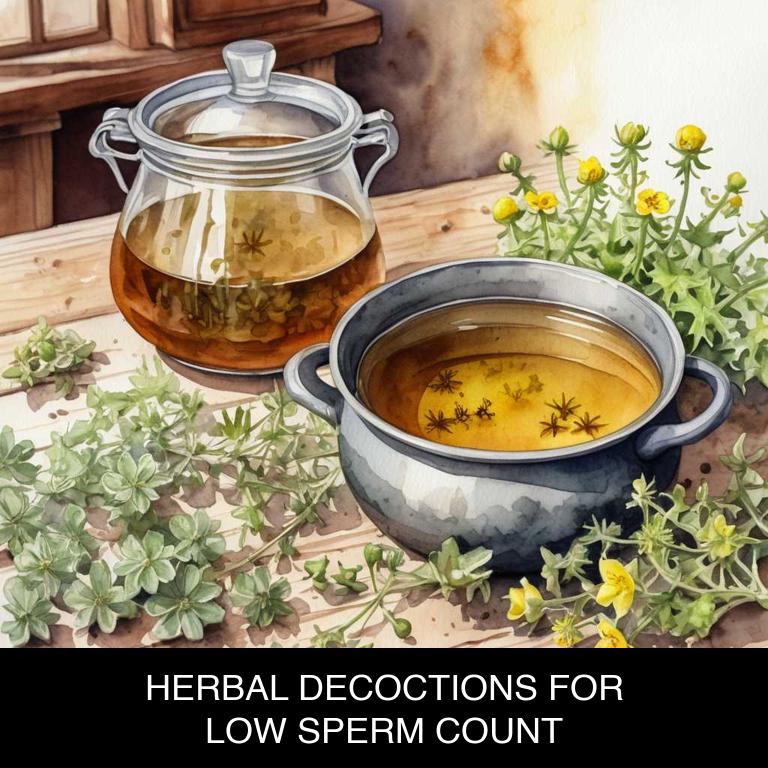
Herbal decoctions for low sperm count are liquid extracts made from a combination of herbs, roots, and leaves that have been traditionally used to enhance fertility in men.
These decoctions help by improving sperm quality, increasing sperm motility, and boosting testosterone levels. For example, Ashwagandha, Tribulus Terrestris, and Cinnamomum verum have been shown to improve sperm count and overall reproductive health.
By incorporating these herbal decoctions into their daily routine, men with low sperm count can potentially improve their chances of conception, leading to a more fulfilling life for themselves and their partners.
The following article describes in detail the most important decoctions for low sperm count, including medicinal properties, parts of herbs to use, and recipes for preparations.
- 1. Tribulus terrestris
- 2. Lepidium meyenii
- 3. Withania somnifera
- 4. Serenoa repens
- 5. Panax ginseng
- 6. Epimedium sagittatum
- 7. Aspalathus linearis
- 8. Ginkgo biloba
- 9. Urtica dioica
- 10. Glycyrrhiza glabra
- What is the best combination of herbal decoctions to use for low sperm count?
- What ailments similar to low sperm count are treated with herbal decoctions?
1. Tribulus terrestris
Puncture vine decoctions helps with low sperm count because it is rich in saponins, which have been shown to improve sperm quality by reducing oxidative stress and inflammation.
The decoction also contains flavonoids and phenolic acids that help to increase the motility of sperm, making it more effective for fertilization.
Additionally, puncture vine has been traditionally used to treat male infertility issues, including low libido and erectile dysfunction, which can contribute to low sperm count.
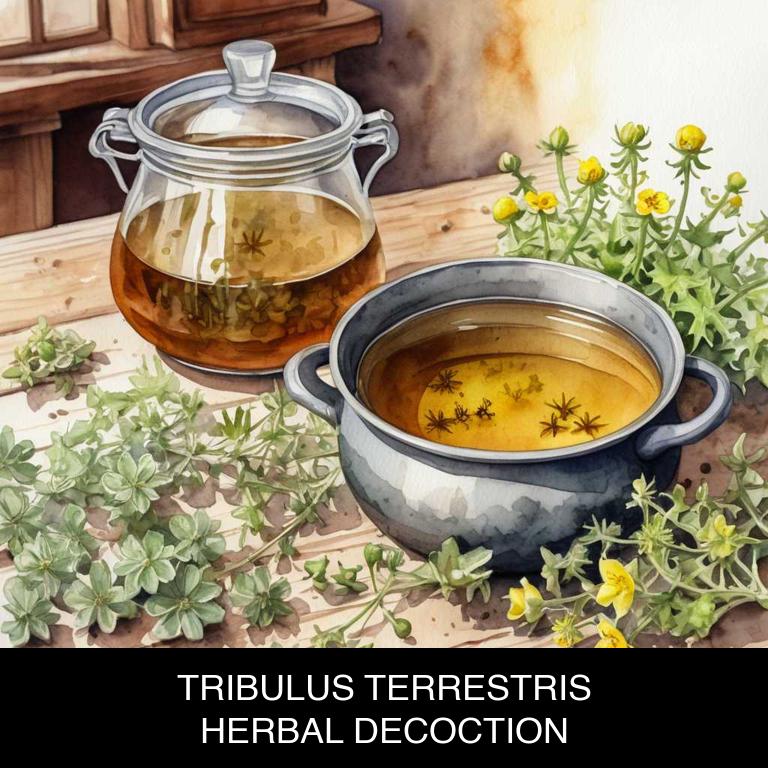
Medicinal Constituents
The list below shows the primary medicinal constituents in Tribulus terrestris decoctions that help with low sperm count.
- Saponins: Saponins, particularly protodioscin, have been shown to improve sperm count and motility by increasing testosterone production and improving sperm morphology.
- Triterpenoid saponins: Triterpenoid saponins, such as diosgenin, have been found to enhance sperm count, motility, and testosterone levels by interacting with androgen receptors and regulating the hypothalamic-pituitary-gonadal axis.
- Phenolic acids: Phenolic acids, including ferulic acid and caffeic acid, may contribute to improved sperm count and motility by reducing oxidative stress and inflammation, which can damage sperm cells and impair fertility.
Parts Used
The list below shows the primary parts of puncture vine used to make decoctions for low sperm count.
- Seeds: The seeds are the most commonly used part due to their high content of bioactive compounds, particularly saponins, which are believed to improve sperm count and fertility.
- Roots: The roots of Tribulus terrestris contain a variety of bioactive compounds, including alkaloids and saponins, which are thought to enhance sperm quality and count.
- Leaves: The leaves of the plant are also used, as they contain antioxidants and other compounds that may help improve fertility and sperm count.
Quick Recipe
The following recipe gives a procedure to make a basic puncture vine for low sperm count.
- Harvest 50-100 grams of dried tribulus terrestris roots and stems from a reliable source.
- Crush the dried plant material into a fine powder using a mortar and pestle.
- Combine 2-3 teaspoons of the powdered plant material with 1 liter of boiling water in a heat-resistant container.
- Simmer the mixture for 10-15 minutes over low heat to release the active compounds.
- Strain the decoction through a cheesecloth or a fine-mesh sieve into a clean container.
2. Lepidium meyenii
Maca decoctions helps with low sperm count because it boosts testosterone levels, which are crucial for fertility in men.
The plant-based compound found in maca stimulates the production of testosterone, increasing sperm motility and quantity. Additionally, maca has been shown to improve overall reproductive health by enhancing blood flow to the genitals, regulating hormone imbalances, and reducing oxidative stress that can damage sperm.
By promoting healthy sperm development and function, maca decoctions may help increase fertility and potentially alleviate concerns related to low sperm count.
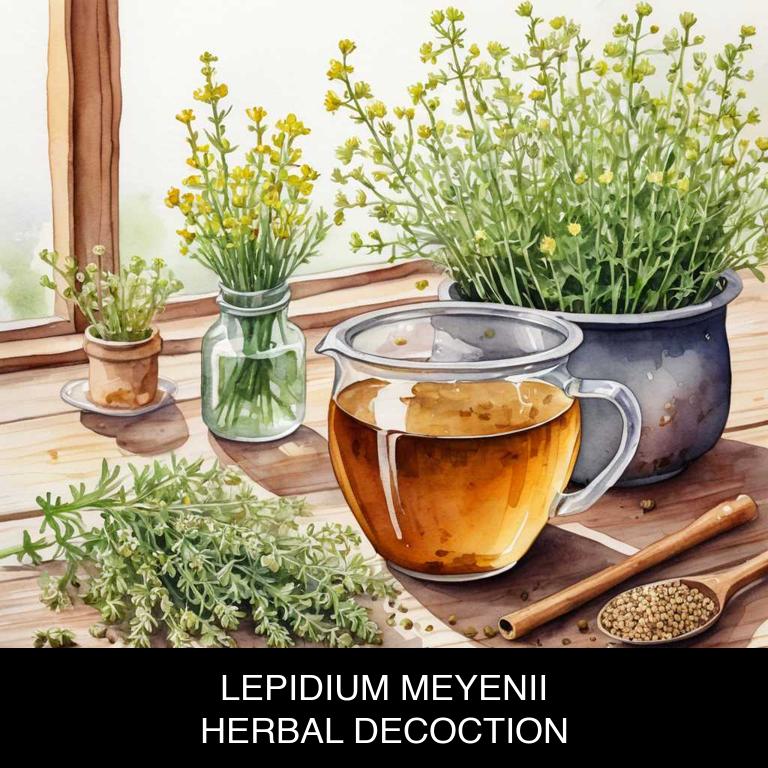
Medicinal Constituents
The list below shows the primary medicinal constituents in Lepidium meyenii decoctions that help with low sperm count.
- Myrosinase: Helps with low sperm count by releasing isothiocyanates, which have anti-inflammatory and antioxidant properties that improve sperm quality and increase fertility.
- S-methylcysteine sulfoxide: Contributes to increased sperm count by acting as a precursor to S-methylcysteine, which may improve sperm motility and morphology, and enhance overall reproductive health.
- Fumaric acid: Helps with low sperm count by modulating the body's hormonal balance, particularly the regulation of testosterone levels, which is essential for sperm production and fertility.
Parts Used
The list below shows the primary parts of maca used to make decoctions for low sperm count.
- Roots: The root of Lepidium meyenii is commonly used to make decoctions for low sperm count due to its high concentration of maca, a bioactive compound believed to improve fertility.
- Seeds: Maca seeds, derived from the plant's root, are used to boost fertility and increase sperm count due to their rich content of maca and other nutrients.
- Stems: Lepidium meyenii stems are used to make decoctions for low sperm count, as they contain bioactive compounds that may enhance fertility and reproductive health.
Quick Recipe
The following recipe gives a procedure to make a basic maca for low sperm count.
- Harvest 30-60 grams of dried lepidium meyenii roots and clean them thoroughly with a fine-mesh strainer.
- Combine the cleaned roots with 2 liters of water in a medium-sized saucepan.
- Bring the water to a boil over high heat then reduce the heat to a simmer for 30-45 minutes.
- Strain the decoction through a cheesecloth or a fine-mesh strainer into a clean container.
- Allow the decoction to cool and store it in the refrigerator for up to 24 hours.
3. Withania somnifera
Ashwagandha decoctions helps with low sperm count because it has been shown to improve semen quality by reducing oxidative stress, inflammation, and stress levels.
The herb's adaptogenic properties help regulate cortisol production, which can otherwise hinder sperm development. Additionally, ashwagandha increases testosterone levels, which is essential for healthy spermatogenesis.
By reducing anxiety and stress, ashwagandha decoctions create a favorable environment for sperm production, ultimately leading to improved fertility in men with low sperm count.
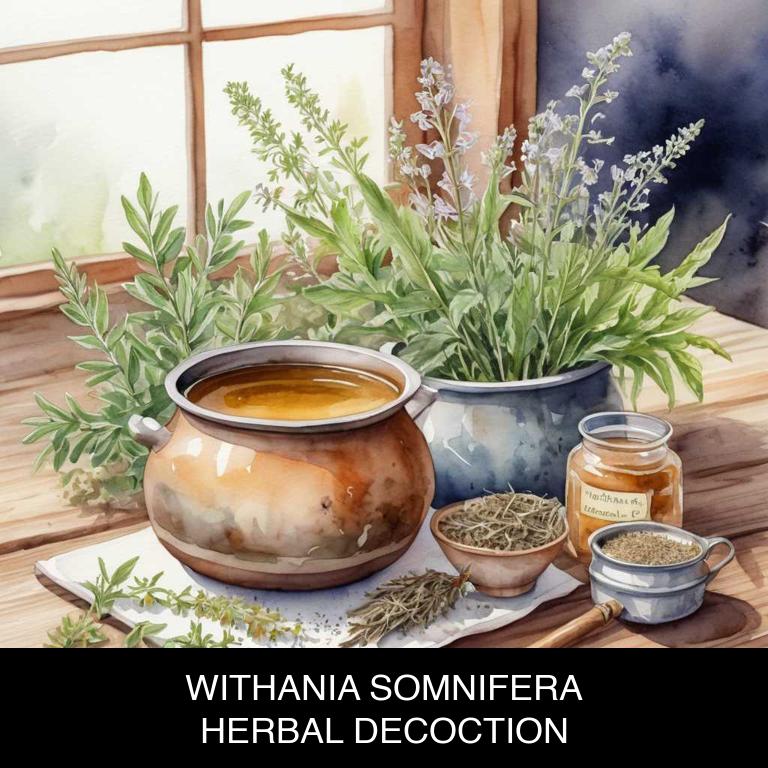
Medicinal Constituents
The list below shows the primary medicinal constituents in Withania somnifera decoctions that help with low sperm count.
- Withanolides: These steroidal lactones help with low sperm count by reducing oxidative stress and inflammation in the testes, which can damage sperm production and quality.
- Withaferin a: This alkaloid has been shown to improve sperm count and motility by reducing apoptosis (cell death) and enhancing the expression of genes involved in sperm development.
- Withanoside iv: This saponin glycoside has antioxidant properties that can help protect sperm from oxidative damage and improve sperm quality, leading to increased fertility.
Parts Used
The list below shows the primary parts of ashwagandha used to make decoctions for low sperm count.
- Roots: The roots of Withania somnifera contain withanolides, which are believed to improve fertility in men by increasing sperm count.
- Leaves: The leaves of Withania somnifera are rich in antioxidants and withanolides, which can help in improving sperm quality and count by reducing oxidative stress.
- Seeds: The seeds of Withania somnifera are a source of withanone, a compound that is thought to enhance sperm production and motility.
Quick Recipe
The following recipe gives a procedure to make a basic ashwagandha for low sperm count.
- Measure out 3-6 grams of dried withania somnifera root powder for the decoction.
- Combine the measured withania somnifera root powder with 500 milliliters of water in a saucepan.
- Heat the saucepan over medium heat for 10-15 minutes or until the mixture reaches boiling point.
- Reduce the heat to low and simmer the mixture for 20-30 minutes or until it reduces slightly.
- Strain the decoction through a cheesecloth or fine-mesh sieve into a cup and discard the solids.
4. Serenoa repens
Saw palmetto decoctions helps with low sperm count because it has been shown to improve sperm quality by increasing sperm concentration, motility, and viability.
The herb's active compound, fatty acid, blocks the conversion of testosterone into dihydrotestosterone (DHT), a hormone that can negatively impact sperm production.
By reducing DHT levels, saw palmetto decoctions may help alleviate symptoms of low sperm count, such as infertility and erectile dysfunction, promoting overall reproductive health and fertility.
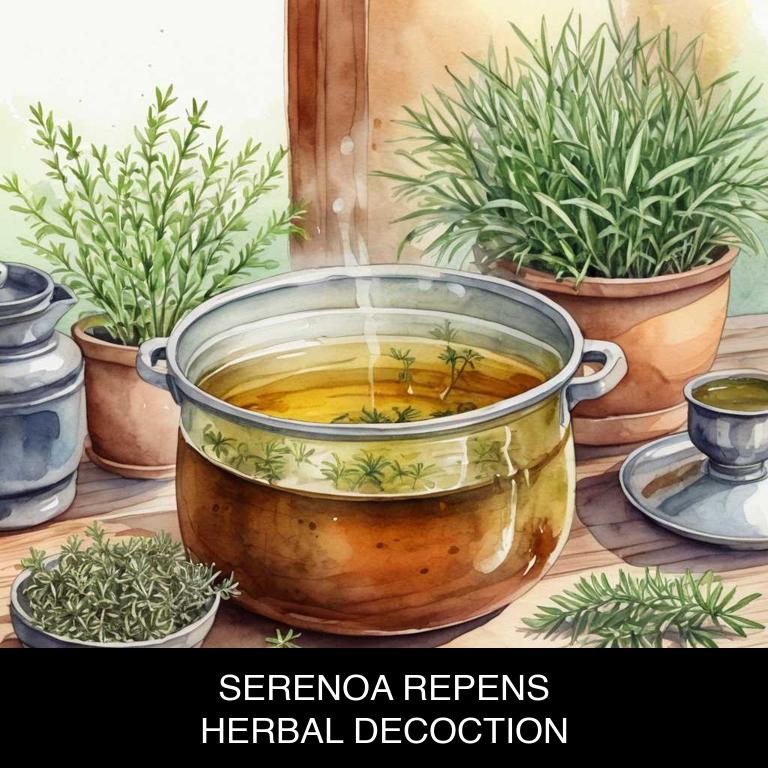
Medicinal Constituents
The list below shows the primary medicinal constituents in Serenoa repens decoctions that help with low sperm count.
- Fatty acids: Fatty acids in Saw Palmetto, particularly oleic acid, may help improve sperm count and motility by reducing inflammation and oxidative stress in the testes.
- Sterols: Beta-sitosterol in Serenoa repens may help improve sperm count and motility by inhibiting the conversion of testosterone to dihydrotestosterone (DHT), a hormone that can contribute to low sperm count.
- Polysaccharides: Polysaccharides in Saw Palmetto may help stimulate the immune system and reduce inflammation, leading to improved sperm count and motility.
Parts Used
The list below shows the primary parts of saw palmetto used to make decoctions for low sperm count.
- Roots: Used to make decoctions due to their high concentration of saponins, which may help improve sperm quality and count.
- Leaves: Utilized for their antioxidant properties, which may contribute to the improvement of sperm count and motility.
- Seeds: Employed for their potential to increase testosterone levels, thereby enhancing sperm production and count.
Quick Recipe
The following recipe gives a procedure to make a basic saw palmetto for low sperm count.
- Harvest 30-60 grams of dried serenoa repens root and clean it thoroughly with a fine-mesh sieve.
- Combine the root with 1 liter of water in a pot and bring it to a boil.
- Reduce the heat to low and simmer for 30-40 minutes or until the liquid has reduced.
- Strain the decoction through a cheesecloth or a fine-mesh sieve into a clean container.
- Store the decoction in the refrigerator for up to 24 hours before consuming it.
5. Panax ginseng
Ginseng decoctions helps with low sperm count because it stimulates the pituitary gland to produce more follicle-stimulating hormone, which in turn increases testosterone production.
The antioxidants and adaptogenic properties of ginseng also help to reduce oxidative stress and inflammation in the testes, promoting healthy sperm development and maturation.
Additionally, ginseng's ability to improve blood flow and energy levels can enhance fertility by supporting overall male reproductive health.
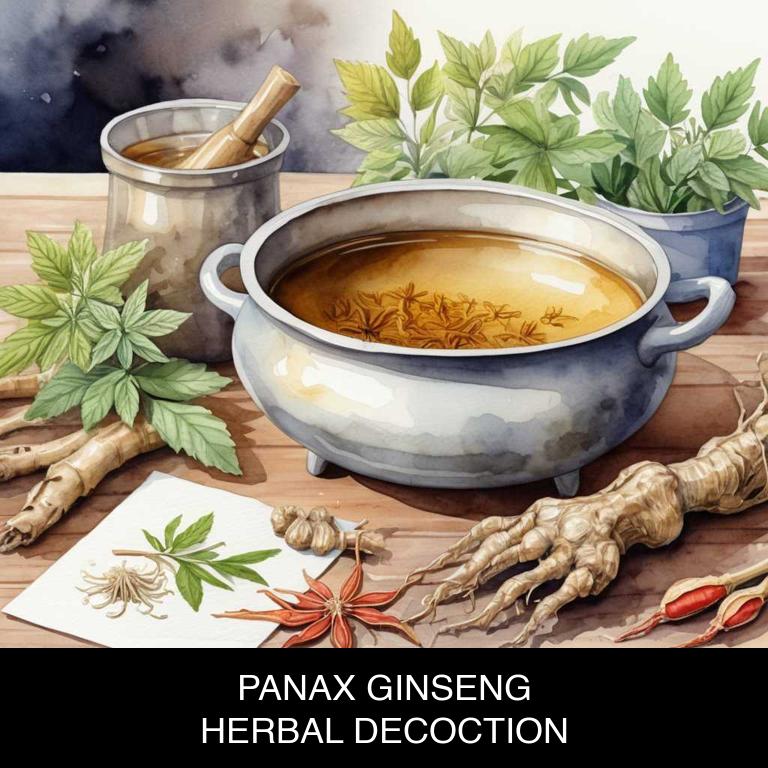
Medicinal Constituents
The list below shows the primary medicinal constituents in Panax ginseng decoctions that help with low sperm count.
- Ginsenosides: These triterpenoid saponins have been shown to improve sperm quality and motility by enhancing the antioxidant defense system in the testes, thereby reducing oxidative stress-induced sperm damage.
- Polyphenols: The phenolic compounds present in Panax ginseng have antioxidant properties, which help to neutralize free radicals and reduce inflammation in the reproductive system, ultimately improving sperm count and fertility.
- Saponin: Ginsenoside Rg1 has been found to stimulate the production of testosterone in the testes, leading to increased sperm production and improved fertility in men with low sperm count.
Parts Used
The list below shows the primary parts of ginseng used to make decoctions for low sperm count.
- Roots: The most used part of Panax ginseng due to its high concentration of ginsenosides, which are believed to improve sperm quality and quantity.
- Leaves: Used to enhance the overall effect of ginsenosides, as they also contain bioactive compounds that support male fertility.
- Stems: Utilized to provide additional bioactive compounds that may help in the treatment of low sperm count, although less commonly used than roots and leaves.
Quick Recipe
The following recipe gives a procedure to make a basic ginseng for low sperm count.
- Gather 6-8 grams of dried panax ginseng roots and rinse them with cold water.
- Combine the dried roots with 2 liters of water in a saucepan and bring to a boil.
- Reduce the heat to a simmer and let the mixture steep for 1 hour.
- Strain the decoction through a cheesecloth or a fine-mesh sieve into a bowl.
- Discard the solids and let the decoction cool to room temperature before serving.
6. Epimedium sagittatum
Barrenwort decoctions helps with low sperm count because they contain bioactive compounds that enhance seminal quality.
The decoction's flavonoids and polyphenols have been shown to increase motility, morphology, and viability of sperm cells, thus improving overall fertility in men. Additionally, Barrenwort's anti-inflammatory properties help reduce oxidative stress, which is a common cause of low sperm count.
By increasing the production and quality of healthy sperm, Barrenwort decoctions can aid in the treatment of male infertility.
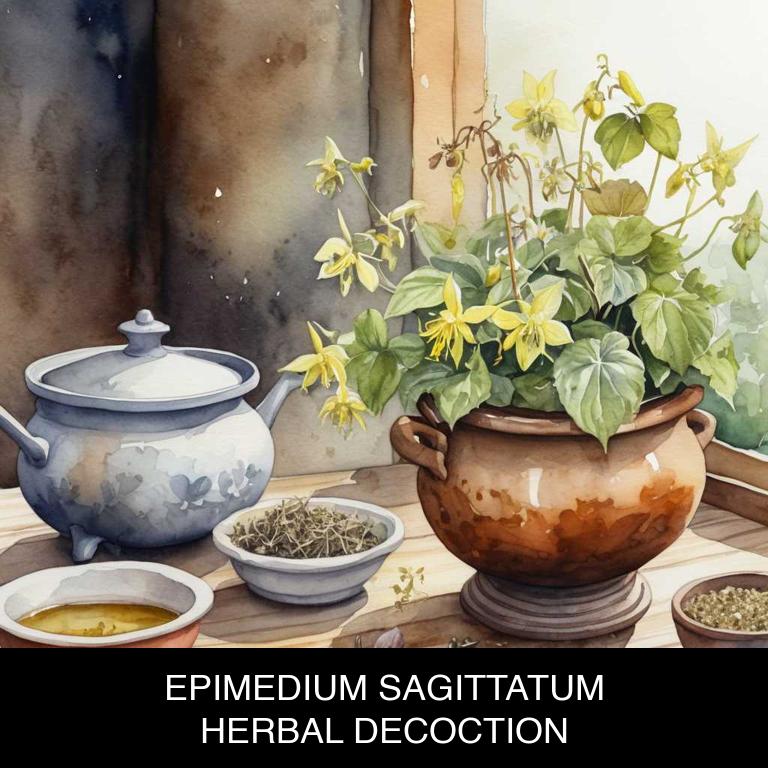
Medicinal Constituents
The list below shows the primary medicinal constituents in Epimedium sagittatum decoctions that help with low sperm count.
- Icariin: Icariin is a flavonoid glycoside that helps with low sperm count by improving sperm quality, motility, and count through its anti-apoptotic and antioxidant properties.
- Epimedin a: Epimedin A is a flavonoid glycoside that helps with low sperm count by enhancing sperm count and motility, as well as improving testosterone levels, through its antioxidant and anti-inflammatory properties.
- Epimedoside a: Epimedoside A is a flavonoid glycoside that helps with low sperm count by improving sperm motility, count, and morphology, as well as enhancing testosterone levels, through its antioxidant and anti-inflammatory properties.
Parts Used
The list below shows the primary parts of barrenwort used to make decoctions for low sperm count.
- Roots: The roots of Epimedium sagittatum are used to make decoctions for low sperm count due to their high concentration of bioactive compounds that stimulate reproductive hormones.
- Leaves: The leaves of Epimedium sagittatum are used to make decoctions for low sperm count due to their antioxidant and anti-inflammatory properties that help improve sperm quality and count.
Quick Recipe
The following recipe gives a procedure to make a basic barrenwort for low sperm count.
- Harvest fresh epimedium sagittatum leaves and stems in the spring or early summer when they are at their peak potency.
- Clean and chop 30g of the harvested epimedium sagittatum material into small pieces to facilitate infusion.
- Combine the chopped epimedium sagittatum with 1 liter of boiling water in a saucepan and let it steep for 10 minutes.
- Strain the decoction through a cheesecloth or a fine-mesh sieve into a clean container discarding the solids.
- Store the prepared decoction in the refrigerator for up to 3 days or freeze it for later use.
7. Aspalathus linearis
Rooibos decoctions helps with low sperm count because of its unique antioxidant and flavonoid-rich composition.
These compounds help to increase the production of seminal fluid, which can improve the overall quality and quantity of semen. Additionally, rooibos contains anti-inflammatory properties that can reduce oxidative stress in the testes, promoting a healthy environment for sperm development.
By incorporating rooibos decoctions into their daily routine, men with low sperm count may experience an increase in fertility and improved reproductive health.
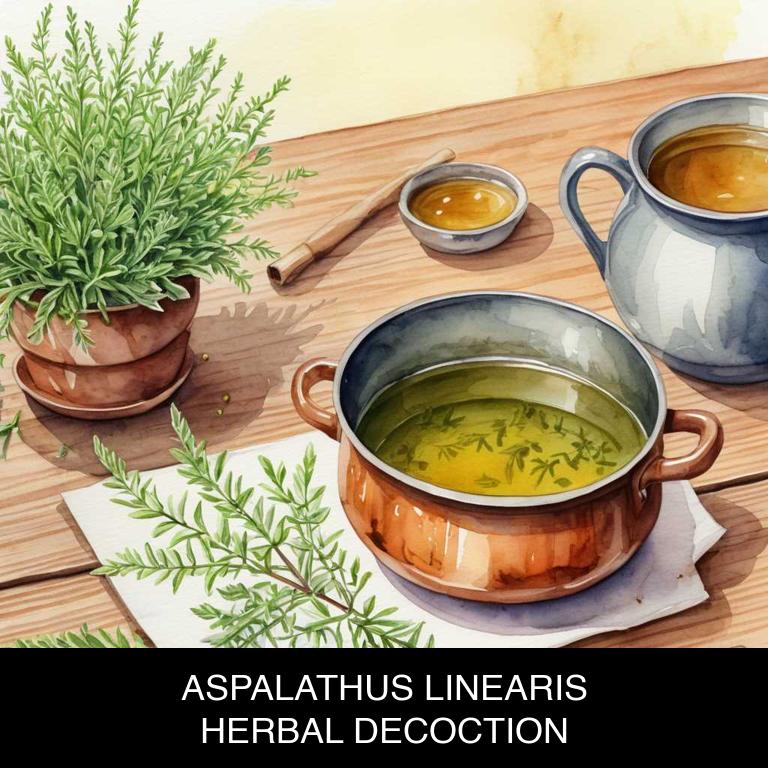
Medicinal Constituents
The list below shows the primary medicinal constituents in Aspalathus linearis decoctions that help with low sperm count.
- Flavonoids: Flavonoids present in Rooibos tea may help improve sperm quality and count by reducing oxidative stress and inflammation in the testes.
- Aspalathin: Aspalathin, a unique C-glucosidic flavonoid found in Rooibos tea, has been shown to have antioxidant properties that may protect sperm cells from damage and improve fertility.
- Alkaloids: The alkaloids, specifically aspaliginans, present in Rooibos tea may help regulate testosterone levels and improve sperm count by reducing oxidative stress and inflammation in the testes.
Parts Used
The list below shows the primary parts of rooibos used to make decoctions for low sperm count.
- Leaves: They are used due to their high antioxidant and flavonoid content, which may help improve sperm quality and fertility.
- Roots: They are used due to their adaptogenic properties, which can help reduce stress and improve reproductive health.
- Seeds: They are used due to their high content of isoorientin, a compound that may help protect sperm from oxidative stress and improve fertility.
Quick Recipe
The following recipe gives a procedure to make a basic rooibos for low sperm count.
- Harvest 20-30 grams of dried leaves from the aspalathus linearis plant for decoction preparation.
- Combine the dried leaves with 1 liter of boiling water in a heat-resistant container.
- Reduce heat to a simmer for 10-15 minutes to allow the herbs to infuse into the water.
- Strain the decoction through a cheesecloth or fine-mesh sieve into a clean container.
- Discard the solids and store the decoction in the refrigerator for up to 24 hours.
8. Ginkgo biloba
Maidenhair tree decoctions helps with low sperm count because it contains a high concentration of antioxidants and flavonoids that help to improve blood flow and oxygenation to the reproductive organs.
The decoction's anti-inflammatory properties also help to reduce oxidative stress and scarring in the epididymis, allowing for healthy sperm production and motility.
Additionally, its adaptogenic properties may help to regulate hormonal imbalances that can contribute to low sperm count, promoting a healthy balance of testosterone and other hormones necessary for fertility.
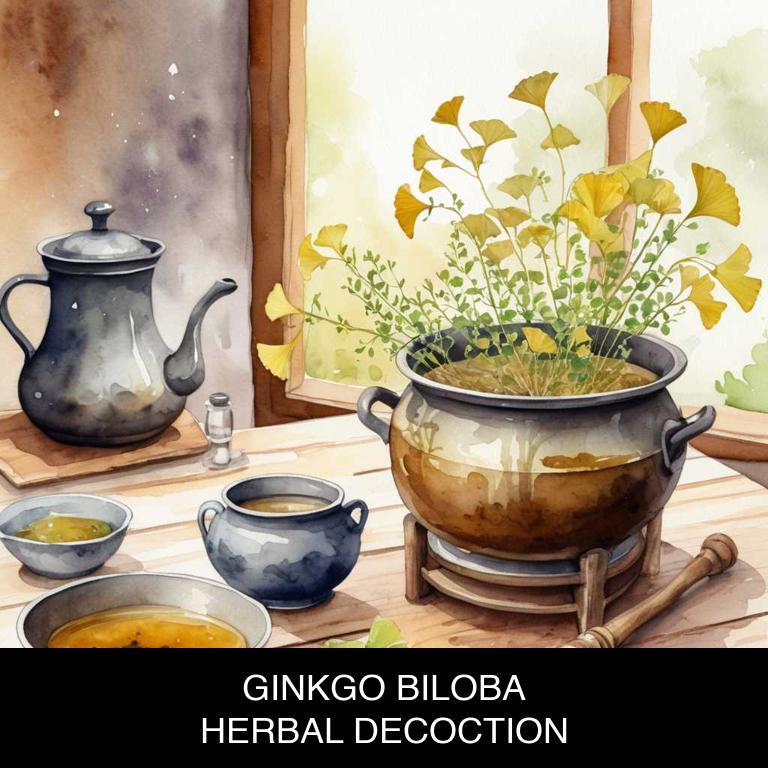
Medicinal Constituents
The list below shows the primary medicinal constituents in Ginkgo biloba decoctions that help with low sperm count.
- Flavonoids: These polyphenolic compounds help improve sperm quality by reducing oxidative stress and inflammation in the testes, thereby promoting healthy sperm production.
- Bilobalide: This sesquiterpene lactone has been shown to improve sperm motility and count by reducing the formation of reactive oxygen species (ROS) and promoting the antioxidant defense system in the testes.
- Quercetin: This flavonoid acts as a potent antioxidant that helps reduce oxidative stress in the testes, thereby improving sperm quality, motility, and count by protecting sperm cells from damage caused by free radicals.
Parts Used
The list below shows the primary parts of maidenhair tree used to make decoctions for low sperm count.
- Leaves: They are the primary source of flavonoids and terpenoids, which are believed to have antioxidant and anti-inflammatory properties that may help improve fertility.
- Seeds: Ginkgo biloba seeds contain ginkgotoxin, which is thought to have a potential role in increasing sperm count by improving blood flow to the reproductive organs.
- Buds: Ginkgo biloba buds are rich in flavonoids, which are believed to have antioxidant and anti-inflammatory properties that may help protect the reproductive system and improve fertility.
Quick Recipe
The following recipe gives a procedure to make a basic maidenhair tree for low sperm count.
- Measure out 120 to 240 milliliters of water and place it in a saucepan for decoction.
- Add 2 to 4 grams of dried ginkgo biloba leaves to the water in the saucepan.
- Bring the water to a boil then reduce heat to a simmer for 10 to 30 minutes.
- Strain the decoction through a cheesecloth or a fine-mesh sieve into a cup or teapot.
- Discard the solids and let the decoction cool to room temperature for consumption.
9. Urtica dioica
Stinging nettle decoctions helps with low sperm count because it promotes a healthy balance of hormones in the body.
The decoction's rich antioxidants and anti-inflammatory properties help to reduce oxidative stress and inflammation that can affect sperm production. Additionally, stinging nettle is known to boost testosterone levels, which is essential for sperm development and motility.
By increasing blood flow to the testes, the decoction also helps to enhance sperm count and quality, making it a natural and effective remedy for addressing low sperm count issues.
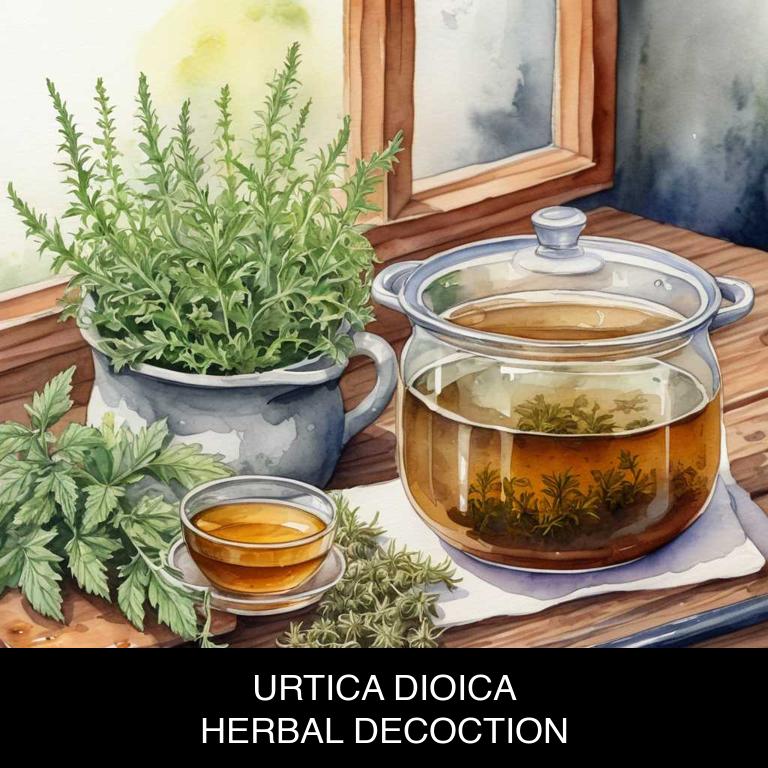
Medicinal Constituents
The list below shows the primary medicinal constituents in Urtica dioica decoctions that help with low sperm count.
- Sterols: Sterols, particularly beta-sitosterol, may help improve sperm count by reducing inflammation and oxidative stress in the testes, promoting a healthy environment for sperm production.
- Phenolic acids: Phenolic acids in Urtica dioica may possess antioxidant properties, which help protect sperm cells from oxidative damage and improve sperm quality, ultimately contributing to higher sperm count.
- Isothiocyanates: Isothiocyanates, such as 3-phenylpropenyl isothiocyanate, may help regulate the balance of hormones involved in sperm production, including testosterone, thereby supporting the development of healthy sperm.
Parts Used
The list below shows the primary parts of stinging nettle used to make decoctions for low sperm count.
- Leaves: They are rich in antioxidants and flavonoids, which help to improve sperm quality and count.
- Roots: They contain diosmin, which has anti-inflammatory properties that may help to improve sperm motility and count.
- Stems: They contain stigmasterol, a compound that may help to improve testosterone levels and sperm count.
Quick Recipe
The following recipe gives a procedure to make a basic stinging nettle for low sperm count.
- Harvest fresh or dried urtica dioica leaves and stems according to local availability and quantity needed.
- Wash the harvested urtica dioica material in cold water to remove any dirt or debris.
- Combine 2-4 teaspoons of the cleaned urtica dioica material with 1 quart of cold water in a pot.
- Bring the urtica dioica mixture to a boil then reduce the heat and let it simmer for 10-30 minutes.
- Strain the urtica dioica decoction through a cheesecloth or fine-mesh sieve into a clean container.
10. Glycyrrhiza glabra
Licorice decoctions helps with low sperm count because of its ability to enhance testosterone levels, improve sperm quality, and boost fertility.
The root contains glycyrrhizin, a compound that inhibits the production of estrogens in the body, which can contribute to low sperm counts. Additionally, licorice root has anti-inflammatory properties that help reduce oxidative stress and inflammation in the testes, promoting a healthy environment for sperm development and maturation.
Regular consumption of licorice decoctions may help increase sperm count and improve overall fertility.

Medicinal Constituents
The list below shows the primary medicinal constituents in Glycyrrhiza glabra decoctions that help with low sperm count.
- Saponins: Saponins in Glycyrrhiza glabra decoctions help improve sperm quality and count by reducing oxidative stress and inflammation in the testes.
- Licopyranocoumarin: Licopyranocoumarin, a phenolic compound, has been shown to have antioxidant and anti-inflammatory properties, which may help protect sperm cells from damage and promote healthy sperm production.
- Glycyrrhizin: Glycyrrhizin, a triterpene saponin, has been found to have anti-inflammatory and antioxidant effects, which may help reduce oxidative stress and inflammation in the testes, leading to improved sperm quality and count.
Parts Used
The list below shows the primary parts of licorice used to make decoctions for low sperm count.
- Roots: Rich in glycyrrhizin, which has been found to improve sperm count and motility.
- Leaves: Contain various flavonoids and phenolic acids that may contribute to their potential benefits for fertility.
- Flowers: May contain compounds that help to balance hormonal levels, which can be beneficial for low sperm count.
Quick Recipe
The following recipe gives a procedure to make a basic licorice for low sperm count.
- Harvest 100 grams of dried roots of glycyrrhiza glabra from a trusted source for medicinal use.
- Grind the dried roots into a fine powder using a mortar and pestle for 5 minutes.
- Combine 1 gram of the powdered roots with 100 milliliters of boiling water in a saucepan.
- Simmer the mixture for 10 minutes over low heat then strain the liquid through a cheesecloth.
- Store the decoction in a glass container in the refrigerator for up to 24 hours.
What is the best combination of herbal decoctions to use for low sperm count?
The best combination of herbal decoctions that help with low sperm count is a blend of Ashwagandha, Shilajit, and Tribulus Terrestris.
Ashwagandha enhances fertility by reducing stress and improving sperm count, while Shilajit increases testosterone levels and promotes sperm quality. Tribulus Terrestris, also known as Vijayasar, stimulates testosterone production and increases sperm count. Combining these three herbs can help boost fertility and improve sperm count, making them a popular choice for men seeking natural remedies for low sperm count.
Regular consumption of these decoctions can lead to improved fertility outcomes.
What ailments similar to low sperm count are treated with herbal decoctions?
Ailments similar to low sperm count that are treated with herbal decoctions are conditions such as impotence, premature ejaculation, and erectile dysfunction.
Herbal remedies like Ashwagandha, Tribulus terrestris, and Gokshura are commonly used to enhance male fertility by improving semen quality, increasing sperm count and motility, and addressing underlying hormonal imbalances.
These natural treatments can also help alleviate stress and anxiety, common factors that contribute to reproductive issues.